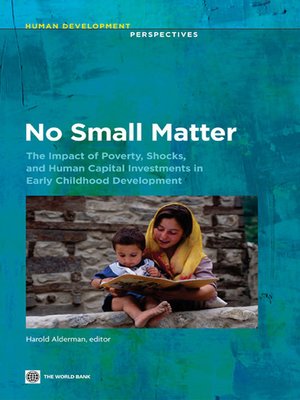No Small Matter
ebook ∣ The Impact of Poverty, Shocks, and Human Capital Investments in Early Childhood Development · Human Development Perspectives
By Harold Alderman

Sign up to save your library
With an OverDrive account, you can save your favorite libraries for at-a-glance information about availability. Find out more about OverDrive accounts.
Find this title in Libby, the library reading app by OverDrive.



Search for a digital library with this title
Title found at these libraries:
| Library Name | Distance |
|---|---|
| Loading... |
Education is often seen as a fundamental means to improve economic prospects for individuals from low income settings. However, even with increased emphasis on basic education for all, many individuals fail to achieve basic skills to succeed in life. The book presents evidence that one core reason is that by the time a child is old enough to attend school, there is already a wide disparity in cognitive skills and in emotional and behavioral development among children from households of different socioeconomic backgrounds. Low levels of cognitive development in early childhood strongly correlate with low socio-economic status (as measured by wealth and parental education) as well as malnutrition. These disadvantages are often exacerbated by economic crises. Fortunately, however, as documented in this volume, there are programs that have proven effective in promoting a child's development through caregiver-child interaction and stimulation, and with well designed preschool programs. While preschool programs currently cover a modest share of low income children, expansion of such services to at risk populations is a cost-effective means of improving overall educational achievement. Thus, focused preschool programs can serve as a key investment in a strategy to reduce the transmission of poverty from poor parents to their children.







